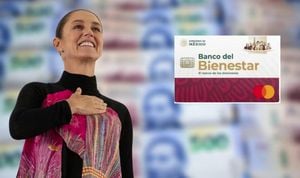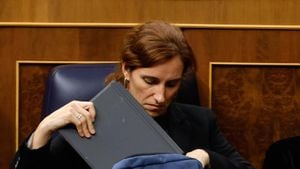Pablo Álvarez's Journey: Spain's Newest Astronaut Shines with Support from the Government
On December 16, 2023, at the prominent La Moncloa, Spanish Prime Minister Pedro Sánchez welcomed Pablo Álvarez, the newest astronaut from Spain, marking another milestone for the country's growing presence in the aerospace sector. The meeting underscored Spain’s commitment to advancing its technological and scientific capabilities, particularly through the lens of space exploration.
Pablo Álvarez, who made history by becoming the third Spaniard to be certified as an ESA astronaut, completed his intensive training at the European Astronaut Centre (EAC) located in Cologne, Germany. His achievement is particularly significant; Álvarez successfully navigated through one of the most demanding astronaut training programs worldwide, culminating in his certification earlier this year. Upon entering the ESA astronaut program, he stood out among 22,500 applicants from various member states.
During the meeting, which also included the participation of Science, Innovation and Universities Minister Diana Morant, Sánchez expressed his pride, emphasizing how Álvarez's accomplishment reflects the collective success of Spain as it positions itself strategically within the aerospace sector. "This is not just your victory, Pablo, but the victory of our entire country," Sánchez proclaimed, celebrating the successful certification and the broader achievements of the national space agency.
The meeting had its lighter moments too. Álvarez gifted Sánchez with a blue ESA jacket, personally inscribed with his name, serving as both a gesture of gratitude and a symbol of the partnership between the Spanish government and the increasingly dynamic space community.
Further highlighting the importance of aerospace development, Minister Morant remarked on how the government is dedicated to bolstering the sector. She noted the government's initiatives aimed at encouraging scientific research and technological advancements within Spain, framing this as part of the overall strategy to inspire and empower future generations.
"We’ll continue fostering opportunities for young talents across our nation,“ she tweeted following the meeting. The sentiment encapsulates the government’s role in promoting not just current successes but future aspirations for the youth and aspiring scientists involved in aerospace fields.
Álvarez's path to becoming a certified astronaut was no small feat. His rigorous training encompassed numerous disciplines - from fundamental biology to advanced flight engineering and robotics, enabling him to perform complex tasks necessary for missions beyond our planet. Notably, Álvarez gained medical training as part of his preparations, learning to perform procedures like sutures and blood sample extractions. Such skills aren’t just for show—they are practical necessities for potential astronaut missions, where medical emergencies can arise far from Earth.
One of the most challenging parts of his preparation involved simulated space walks, which taught him how to adapt to microgravity conditions—a key aspect when working on and outside the International Space Station. This intensive training regime also involved learning foreign languages, particularly Russian, which is deemed pivotal for communication on international projects involving multiple partners.
Despite having recently completed his training, Álvarez's potential impact on the aerospace community is already palpable. He is expected to inspire the next wave of scientists and engineers who view his ascent as both attainable and motivating. Following his meeting with Sánchez, Álvarez plans to visit the European Space Astronomy Centre located near Madrid to engage with the media, where he’ll outline the progress of his training and discuss potential career paths for budding aerospace professionals.
Álvarez's emergence as the third Spanish astronaut—following Pedro Duque and Miguel López-Alegría—fits seamlessly within Spain's ambitious strategy to cement itself as not just a participant, but as a leader within the global aerospace arena. His success, as highlighted during his meeting with Sánchez, reflects the resilience and ingenuity found within Spain's scientific community, poised to address the world’s future challenges and opportunities.
Looking forward, the Spanish government displays unwavering support for space efforts and education, aiming to uplift the aerospace sector through consistent initiatives and policy-making. The meeting between Sánchez and Álvarez serves as both a recognition of past achievements and as an encouragement for future advancements, laying the groundwork for Spain's role as not just an observer, but as a key player on the international stage of space exploration.
Overall, Pablo Álvarez’s story is one of dreams turned reality—where individual talent meets governmental support. The collaborative efforts embody the essence of innovation and exploration. With each step forward, as he prepares for his journeys beyond Earth's atmosphere, the anticipation of new discoveries keeps the nation's gaze firmly fixed on the stars. It's not just about one man’s achievement, but the collective spirit of curiosity and endeavor shared by Spain's scientists and citizens alike.



